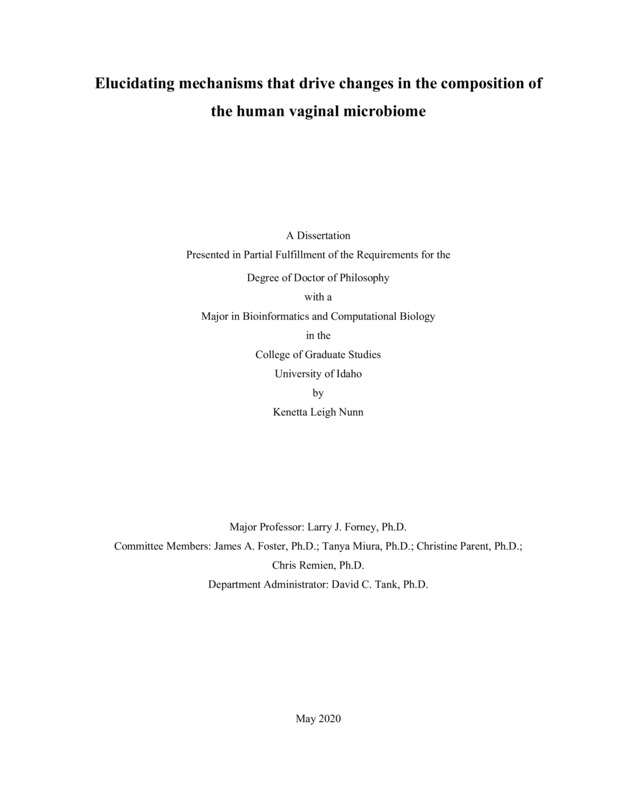Elucidating mechanisms that drive changes in the composition of the human vaginal microbiome
Nunn, Kenetta Leigh. (2020-01). Elucidating mechanisms that drive changes in the composition of the human vaginal microbiome. Theses and Dissertations Collection, University of Idaho Library Digital Collections. https://www.lib.uidaho.edu/digital/etd/items/nunn_idaho_0089e_11789.html
- Title:
- Elucidating mechanisms that drive changes in the composition of the human vaginal microbiome
- Author:
- Nunn, Kenetta Leigh
- ORCID:
- 0000-0002-1440-1986
- Date:
- 2020-01
- Embargo Remove Date:
- 2022-09-03
- Keywords:
- amylase estrogen glycogen Lactobacillus vaginal microbiome
- Program:
- Bioinformatics & Computational Biology
- Subject Category:
- Microbiology; Ecology; Health sciences
- Abstract:
-
The influence of the vaginal microbiome on women’s relative risk to disease and reproductive complications has been well documented. In the last decade, extensive cross-sectional and longitudinal studies have shown that many types of vaginal communities are found in healthy women, and that the composition of these communities can change over a matter of days. Currently, we have a poor understanding of the factors that cause compositional differences observed between women and temporal changes within women. Thus, the goal of my work is to fill this gap in knowledge. In the opening chapter, I briefly review what is known about the composition of vaginal communities in reproductive age women. Due to the positive association with Lactobacillus in the vagina and vaginal health, I narrowed the focus on species within this genus. Additionally, I discuss two host factors, namely estrogen and glycogen that have been associated with changes in the abundances of lactobacilli over a woman’s lifespan.
Next, I characterized the composition of vaginal bacterial communities in a cohort of black adolescent women based on differences in the total abundances of Lactobacillus. Then I explore the relationships between estrogen, glycogen, stress, and vaginal community composition. I confirmed previous findings that glycogen levels are associated with high abundances of lactobacilli in vaginal communities. I also report that estradiol levels do not correlate with vaginal glycogen measurements, nor vaginal community composition. This finding is noteworthy as it suggests the association between estrogen, glycogen, and vaginal lactobacilli is more complex than previously thought. This study addresses potential developmental factors that influence the composition of vaginal communities and provides new insights into the kinds of communities that are present among black adolescent women.
In my third chapter, I differentiated putative amylases in the human vagina, which likely break down glycogen into simpler sugars that are fermented by vaginal lactobacilli. For this work, I designed a pilot study to collect vaginal samples from 23 reproductive age women. Using metagenomics and proteomics, I identified putative amylases expressed in vaginal fluids that mapped to the metagenomes of vaginal bacteria. I report novel findings that there are multiple amylases in the human vagina that are produced by both the host and bacteria within the community.
Finally, I explore the transition from pregnancy to postpartum in a cohort of 48 women. I document findings that are consistent with previous studies that showed the composition of vaginal communities changes from pregnancy to postpartum and is marked by reduced abundances of Lactobacillus and increased alpha diversity. I report new findings of host-associated compounds that are significantly associated with the changes observed during postpartum.
- Description:
- doctoral, Ph.D., Bioinformatics & Computational Biology -- University of Idaho - College of Graduate Studies, 2020-01
- Major Professor:
- Forney, Larry J
- Committee:
- Foster, James A; Miura, Tanya ; Parent, Christine ; Remien, Chris
- Defense Date:
- 2020-01
- Identifier:
- Nunn_idaho_0089E_11789
- Type:
- Text
- Format Original:
- Format:
- application/pdf
- Rights:
- In Copyright - Educational Use Permitted. For more information, please contact University of Idaho Library Special Collections and Archives Department at libspec@uidaho.edu.
- Standardized Rights:
- http://rightsstatements.org/vocab/InC-EDU/1.0/

